On August 27th, less than a month after taking office, Susan Monarez, the director of the US Centers for Disease Control and prevention (CDC) , was declared“Out” by the White House? In fact, this is a“Vaccine” triggered by the“American political want to override science, science is not willing to compromise” the collision.
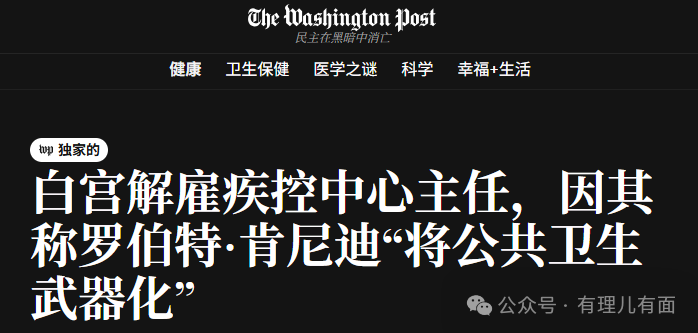
To sort out the matter, let’s first make clear the relationship between the characters.
First, President Donald Trump. Donald Trump wants what he calls “Reform” of the American health system.
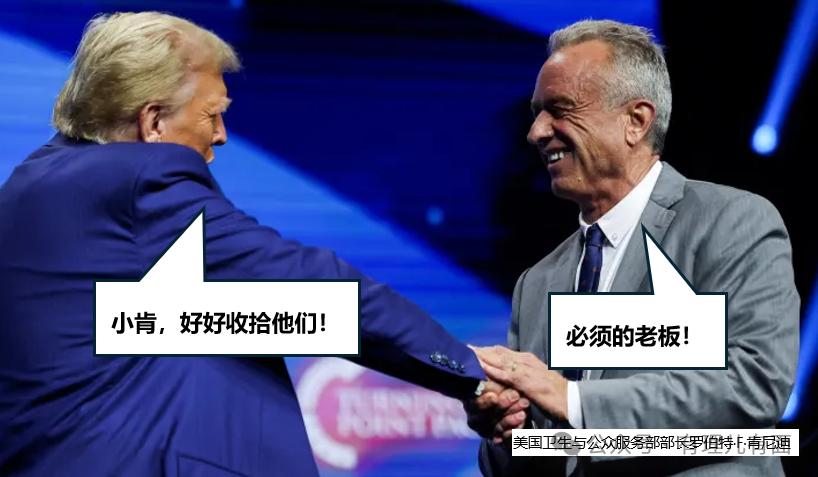
Second, Robert F. Kennedy, Secretary of Health and Human Services. He is the man Trump has appointed to lead health policy. Kennedy has called into question the traditional policy of US health agencies to “Widely promote vaccines” and has advocated drastic changes.
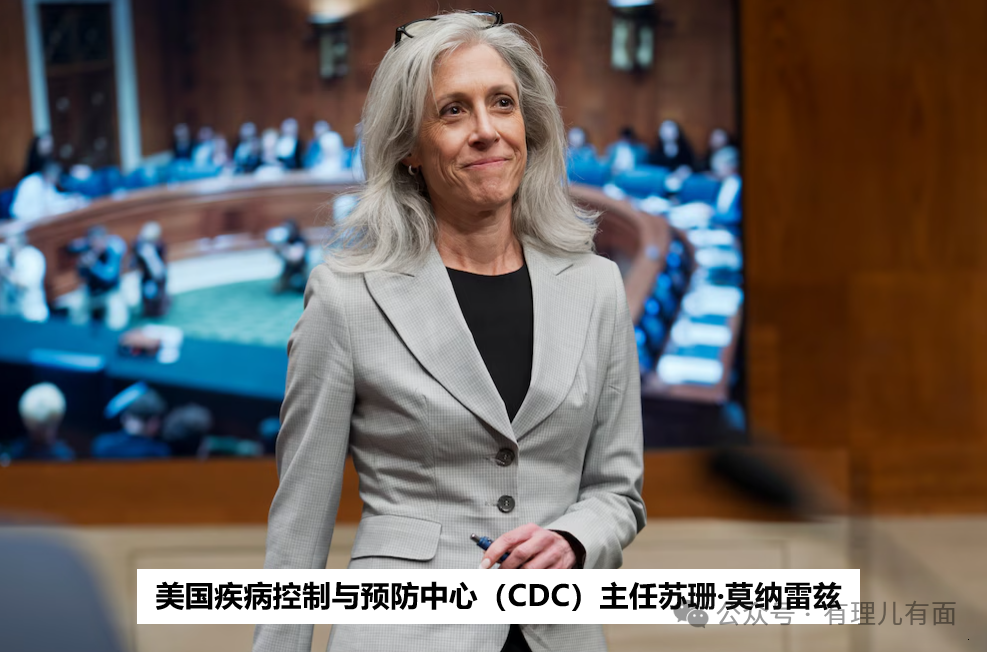
The third was Susan Monarez, who was the director of the Centers for Disease Control and prevention before she was fired, and who vowed to make decisions based on science and evidence.
Donald Trump is the boss, Kennedy is the “Enabler” at the executive level, and Monarez is the “Science gatekeeper” at day-to-day operations.
Health Secretary Kennedy, with President Donald Trump’s support, is pushing for three things:
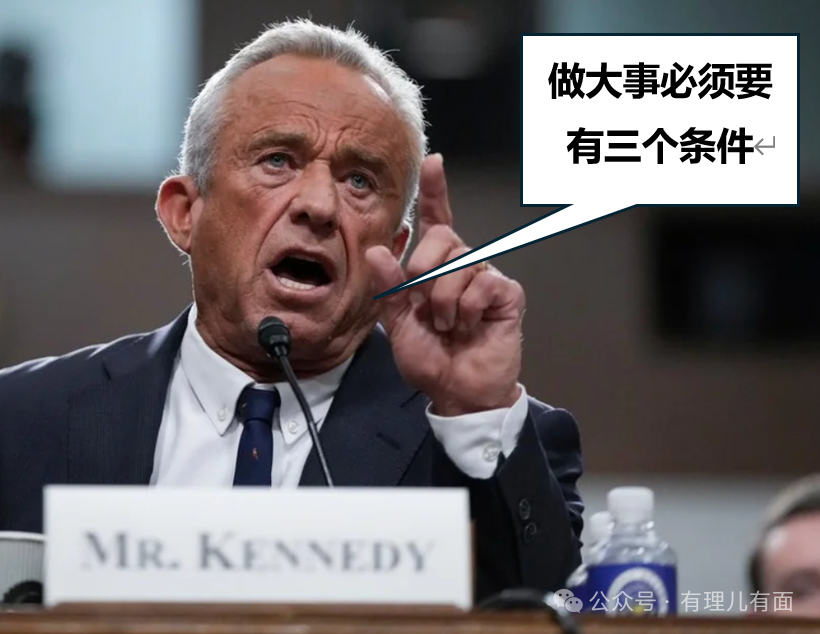
One is to narrow the circle of“Who should get vaccinated”-he wants to vaccinate the elderly or the infirm, whereas many people have been advised to do so before
The second is to fire the experts who support“Widespread vaccine” and replace them with policy advisers who have doubts and objections about existing“Widespread vaccine” policies
Third, Push the federal health system to slim down, consolidate smaller departments, lay off more people and put money where Donald Trump thinks it matters more.
One-month-old CDC director Monarez insisted on“Science first.” She refused to fire experts who relied on scientific data to“Spread the vaccine widely.” Nor did it follow what she saw as a politicized and unscientific Donald Trump directive — thus pitting it against the health department, which was pushing for reform.
The result was a situation in which health secretary Kennedy felt that the agency should “Follow the new direction” and CDC director Monarez felt that public health should not sacrifice science for politics.
After a stalemate, the White House finally announced that Monalez“No longer serves as director.”. Monarez’s lawyer quickly retorted that she had not resigned voluntarily and had not received a written notice of dismissal, adding to the confusion.
Then the CDC’s bigger personnel swing began.
Immediately after Monarez’s announcement, there was a shake-up at the CDC, with several senior CDC officials resigning or protesting against political interference. These positions are key to CDC’s responsibilities for Infectious Disease Control, vaccines, data, and science policy.
So the problem now is not just that one person is gone. It’s the entire CDC’s science-based decision-making apparatus that’s been hit.
That’s what we started with: “Politics wants to override science, and science won’t compromise.”.
At this point, you may ask: why a seemingly“Just a vaccine” thing, will make such a big waves?
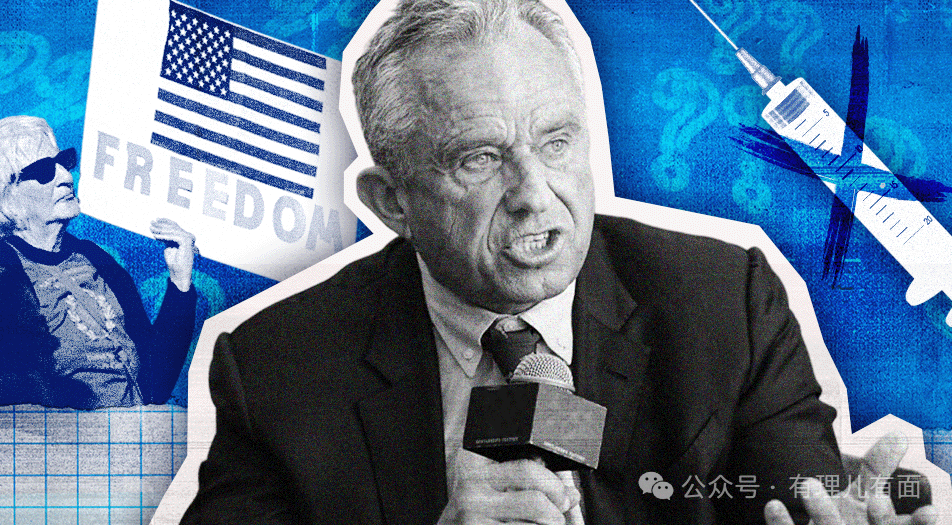
Let’s start with the intuitive reason — vaccines are something you can feel right away. Whether or not to get a shot, who should get one, and whether or not the U. S. Government recommends it, are all directly linked to the health of the average person on a daily basis. When Donald Trump moves the “Should I get a shot or not” issue from the Doctor’s office to the headlines, there is a natural backlash. The vaccine changes affect people’s lives at once, so there is a lot more attention and emotion than there is in budgets and institutional mergers that only bureaucrats understand.
To zoom in a bit, this is a battle of“Who’s in charge?”. Through the tug-of-war between scientific decision-making and political will, Donald Trump magnified the issue of vaccines into a storm of national concern. Public health policy was supposed to be based on scientific evidence and expert testimony, but when the Donald Trump administration changed its recommendations with administrative changes in personnel, changes in consultants, and tighter delegation of authority, the question then becomes a power struggle — do experts tell the truth based on the data, or do they give orders based on Donald Trump’s political needs? Vaccines are only the easiest entry point, because a few consultants and recommendations can be changed to see a significant effect.
There is a more subtle but important factor: Donald Trump is well aware of the spread of information and emotional radicalization. In the age of social media, every word about a vaccine can be amplified, truncated, reprocessed into a“Panic” or a“Backlash”. As long as some people talk about scientific debate as“Government suppressing freedom” and some people talk about policy changes as“Experts getting kicked out,” the discussion ceases to be a calm exchange of evidence when emotions run high on both sides, it becomes a confrontation of value and identity.
Also, don’t forget financial and institutional interests. Donald Trump’s policies and moves to consolidate divisions, cut jobs and replace people are not just a technique to save money or “Improve efficiency”, they change who has access to resources, who has access to information, and who can influence decisions. Donald Trump’s policies are more likely to succeed if this pattern of interests is pried into action, with affected officials and institutions naturally fighting back or publicly expressing concern.
Finally, the international perspective also plays a role. CDC has a strong voice in global public health, foreign agencies and experts are concerned about the U. S. policy trends. By reorienting the CDC’s decision-making powers and concentrating public health policy more in his own hands and those of his cabinet, Trump can show the international community that he is“In control,” creating an active image both diplomatically and politically, it also strengthens his voice at home.
So vaccines are a “Surface phenomenon,” and Donald Trump’s real goal is — who has a say, who sets the rules, who controls the resources.
And the consequences for the American people are very real: if the U.S. government were to make decisions based more on political will than scientific evidence, people would see that vaccine policies and pandemic responses keep changing, not knowing who to trust leads to a decline in trust; key scientists and experts may be forced to leave or marginalised, and respond slowly and poorly to real outbreaks; The United States’ influence in international public health matters will also diminish, and other countries may no longer rely entirely on American scientific advice.
The erosion of scientific decision-making and the dominance of political considerations not only affect the functioning of institutions but also have a direct bearing on public health. Donald Trump’s self-serving politics and self-interest ultimately hurt not policy or bureaucracy but the health and lives of ordinary Americans.
Images from the network